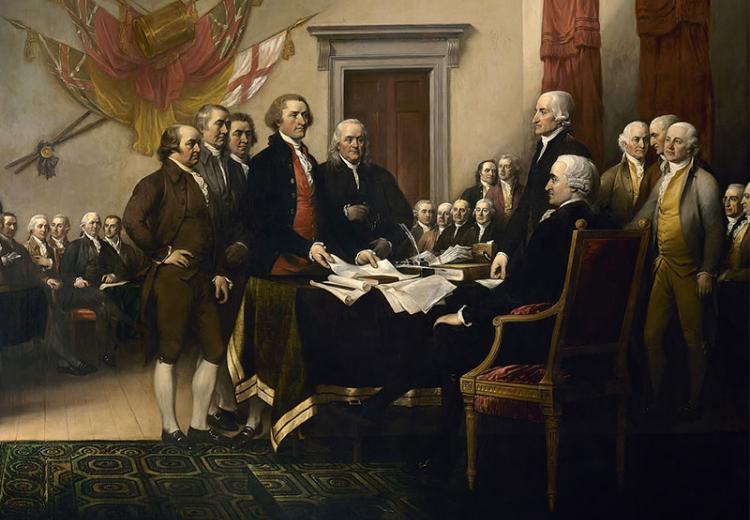Jefferson vs. Franklin: Revolutionary Philosophers

Founding Fathers.
Q: What state papers should be considered in connecting the Constitution of the United States with the Magna Carta?
A: …Plans for colonial union were proposed from time to time, the most important of them being the Albany Plan of 1754, of which Benjamin Franklin was the author.
— Questions and Answers Pertaining to the Constitution, by Sol Bloom
"Dr. Franklin drew up and presented to Congress, on the 21st of July (1775), a plan of confederation… In some of its articles it differed essentially from the one that was finally adopted, and approached more nearly to the present constitution… Taken in all its parts, this plan was little else than a virtual declaration of independence."
Have Benjamin Franklin's philosophical contributions to the early development of our government been overlooked? He was, of course, a member of the committee that worked on the Declaration of Independence, but did you know he had already penned his own "virtual declaration of independence" one year earlier? Franklin is widely known as the "Sage of the Constitutional Convention," but few know he had written a precursor to the Constitution in 1754, more than 30 years earlier! Thomas Jefferson is credited as the author the Declaration of Independence, a grand achievement. But, though Jefferson alone composed the draft of the Declaration, even he admitted in 1823, "… Before I reported it to the committee I communicated it separately to Dr. Franklin and Mr. Adams requesting their corrections."
Both Jefferson and Franklin were critical in injecting into the debates of the Founding Fathers vital philosophical and political ideas. Jefferson's contributions are more widely recognized. Has Franklin, the only one of the two who signed both the Declaration of Independence and the Constitution, been unfairly disregarded as a significant philosopher of the American Revolution?
Help your students deepen their understanding of the documents crucial to the birth of our democracy as they scrutinize the contributions of two towering figures of the American Revolutionary period and beyond.
Guiding Questions
What ideas did Franklin contribute to the philosophical debate of the leaders of the movement for American independence?
What ideas did Jefferson articulate?
Learning Objectives
State connections among Franklin’s Albany Plan of 1754 and Plan of Confederation of 1775 and the U.S. Constitution and/or the Declaration of Independence.
State connections among Jefferson’s Summary View of the Rights of British America and Draft of the Virginia Constitution and/or the U.S. Constitution and the Declaration of Independence.
State connections between George Mason’s Virginia Declaration of Rights and Jefferson’s Declaration of Independence.
Give examples of the philosophical and political contributions of Franklin and Jefferson
